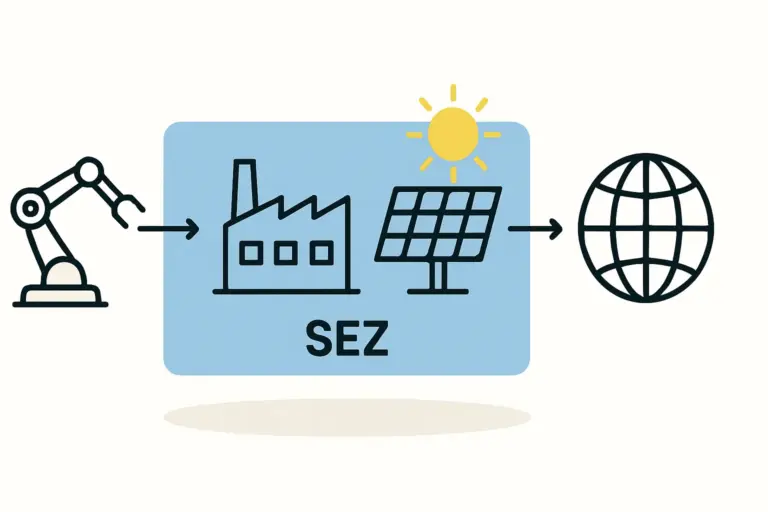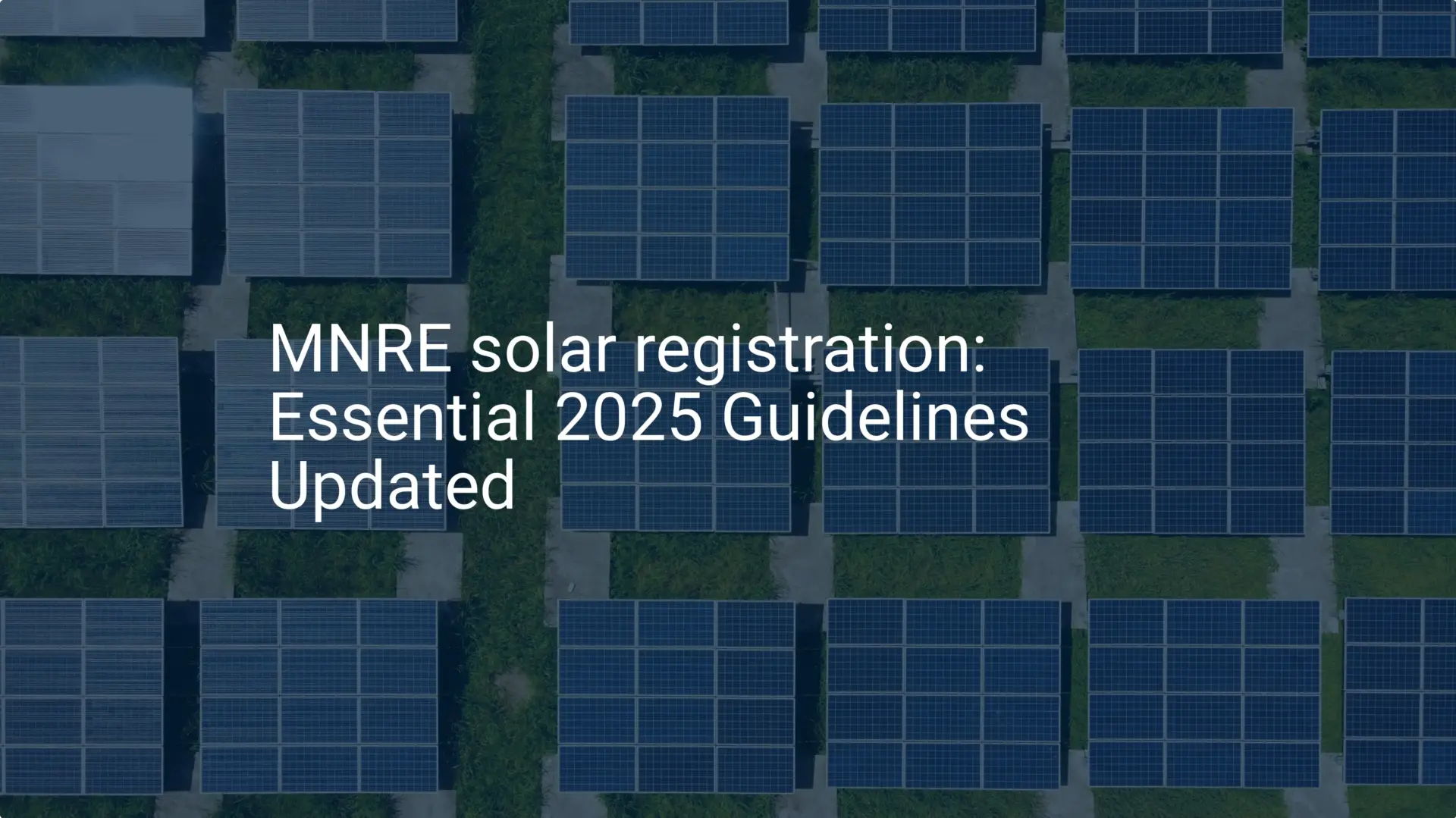An entrepreneur invests considerable capital to establish a state-of-the-art solar module factory in India. With an efficient production line, a skilled team, and initial modules that meet international quality standards, everything seems ready for market entry.
Yet, when they approach major buyers for large-scale, government-backed projects, the doors remain closed. The reason: a crucial, non-negotiable regulatory hurdle known as the Approved List of Models and Manufacturers, or ALMM.
For any new investor looking to enter India’s vibrant solar manufacturing sector, understanding the ALMM is not just a compliance task—it is the cornerstone of a viable business strategy. This article breaks down what the ALMM is, explores its impact on market access, and outlines the strategic steps required for a new manufacturer to gain inclusion.
What is the ALMM?
The Approved List of Models and Manufacturers (ALMM) is a mandatory listing issued by India’s Ministry of New and Renewable Energy (MNRE). The list serves a dual purpose: to ensure the quality, reliability, and performance of solar modules used in specific domestic projects, while also promoting local manufacturing under the government’s “Make in India” initiative.

Think of the ALMM as an exclusive pre-qualification list. Only manufacturers and their specific solar module models that appear on this list are eligible for use in:
- Government-owned solar projects.
- Government-assisted solar projects.
- Projects under government schemes and programs.
After a temporary suspension to ease supply chain pressures, the ALMM was fully reinstated on April 1, 2024. This move underscores its long-term importance in the Indian government’s energy strategy, making compliance more critical than ever for manufacturers.
The Business Impact: Why ALMM Compliance is Non-Negotiable
For a new manufacturer, inclusion in the ALMM is not merely a bureaucratic step; it is the gateway to the largest and most stable segment of the Indian solar market. Failing to get listed can severely limit a new factory’s commercial viability.
Restricted Market Access
The primary impact is direct: without an ALMM listing, a manufacturer is automatically excluded from bidding on or supplying to a substantial portion of all new solar capacity being installed in India. This effectively cedes a major market share to listed competitors.
Credibility and Bankability
Beyond government projects, an ALMM listing serves as a powerful signal of quality and reliability to the broader market. Private commercial and industrial clients, as well as project financiers, often view ALMM inclusion as a benchmark for due diligence. A manufacturer on the list is generally considered more “bankable,” easing project financing for its customers.
Strategic Disadvantage
A new business operating without ALMM approval is confined to a smaller, more fragmented market, such as rooftop installations for private residences or off-grid applications. While these markets are valuable, they often lack the scale of government tenders, making it difficult to achieve the production volumes needed for profitability.
The Path to ALMM Inclusion: A Step-by-Step Overview
The process of getting listed on the ALMM is rigorous and requires meticulous preparation. This isn’t a process that can be started after production has begun; it must be integrated into the factory’s initial design and operational planning.
Step 1: Meeting Prerequisite Standards
Before an ALMM application can even be considered, a manufacturer’s solar modules must be certified by the Bureau of Indian Standards (BIS). This mandatory product certification ensures modules meet specified safety and performance criteria, often harmonized with global IEC standards. Achieving solar module certification is the foundational step.
Step 2: The Application Process
Once BIS certification is secured, the manufacturer can submit an online application to the MNRE. This requires comprehensive documentation, including company registration and financial details, detailed specifications of the manufacturing facility and its annual production capacity, valid BIS certification for each module model, and a detailed report on the manufacturing process and quality control procedures.
Step 3: The Factory Inspection
This is the most critical stage. The National Institute of Solar Energy (NISE), an autonomous body under the MNRE, conducts a thorough physical inspection of the manufacturing facility. Auditors evaluate every aspect of the production process, from incoming raw materials to the final testing of finished modules.

Key areas of focus include the quality and condition of the solar manufacturing equipment, the robustness of in-process quality checks and lab testing capabilities, the ability to track components throughout the production cycle, and the presence of clear, well-maintained records. Experience from turnkey projects shows that a well-documented and organized quality management system is crucial for a successful NISE audit. The factory must be fully operational and demonstrate consistent production capabilities.
Step 4: Listing and Validity
If the factory audit is successful, the MNRE will approve the application. The manufacturer and its specific module models are then added to the official ALMM List-I. This listing is typically valid for two years, after which a renewal process, often including another inspection, is required.
Strategic Considerations for New Entrants
Aspiring manufacturers must treat ALMM as a core business objective from day one.
Timeline Planning
The entire process—from preparing documentation and undergoing the NISE inspection to final approval—can take several months. A realistic timeline, potentially six to nine months, must be factored into the overall solar factory business plan. Any delay in ALMM approval directly translates to a delay in revenue generation from key market segments.
Investment in Quality
The ALMM process is fundamentally a quality audit. Attempting to cut corners on machinery, testing equipment, or quality control systems is a false economy. Investing in a robust, reliable production line from the outset is a prerequisite for passing the NISE inspection and building a sustainable business.
Production Readiness
The NISE inspection is not conducted on a theoretical or pilot line. The factory must be fully commissioned and capable of producing modules to the specifications listed in the application. This readiness must be achieved before the audit is scheduled.

Frequently Asked Questions (FAQ) for Aspiring Producers
Is ALMM applicable to all solar projects in India?
No. It is mandatory for government and government-assisted projects. However, its use as a quality benchmark is increasingly common in the private sector. It does not apply to projects set up for captive consumption or to manufacturers who produce modules for export.
Can foreign manufacturers get on the ALMM list?
Yes, foreign manufacturers can apply. However, they must also undergo a NISE factory inspection in their home country, which involves additional logistics and costs.
What are the costs associated with the ALMM application?
The MNRE charges an application fee and an inspection fee, which vary based on the manufacturer’s production capacity. For foreign manufacturers, the costs are higher to account for the travel and logistics of the inspection team.
What happens if a manufacturer fails the NISE inspection?
If deficiencies are found, NISE will provide a report detailing the non-compliance issues. The manufacturer is typically given a timeframe to rectify these issues and can then apply for a re-inspection.
Does ALMM listing guarantee sales?
No. An ALMM listing is a pre-qualification; it grants eligibility to participate in tenders and supply to certain projects. Manufacturers must still compete on price, technology, and other commercial terms to win contracts.
ALMM as a Strategic Pillar, Not an Afterthought
For any entrepreneur entering the Indian solar manufacturing market, the ALMM is not an administrative afterthought but a central pillar of the business strategy. It dictates market access, influences brand reputation, and validates the quality of the production facility.
Successfully navigating the ALMM process requires careful planning, a commitment to quality from the very beginning, and a deep understanding of the regulatory landscape. This expertise is at the core of the structured guidance pvknowhow.com provides, helping new investors build their ventures on a solid foundation for long-term success in one of the world’s most promising solar markets.






